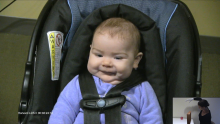What do infants know about actions they cannot yet perform?
Date Posted:
August 21, 2019
Date Recorded:
August 21, 2019
CBMM Speaker(s):
Shari Liu All Captioned Videos Publication Releases VIDEO
Description:
Harvard University graduate student Shari Liu discuses their findings about how human infants by 3-months-old already have an abstract notion of other people, their goals and their actions, as described in their latest paper just released in PNAS.
[MUSIC PLAYING] SHARI LU: I'm Shari Lu. I'm a grad student at Harvard University in the Spelke Lab. In our lab, we're interested in the origins of our common sense understanding of the world. So for example, we're interested in how we think about objects and their movements, people and their actions and relationships, and we're interested in the origins of this knowledge, so we study this by conducting behavioral experiments on infants and young children.
From the birth of philosophy, psychology, and artificial intelligence, humans have pondered what we learn about the world through our own experiences. So consider the problem of figuring out other people, what they're doing, and what they're thinking about. The question is, do we learn these things from having minds and experiencing actions for ourselves?
A prevailing theory in developmental psychology is that, indeed, what babies do is that they take in sensory input, and they build these higher abstract concepts like the goals of other people's actions and the cost of their actions from this input. So the most striking evidence for this comes from studies of three-month-old babies, and what's really interesting about them is that they're actually called pre-reaching. They're one to two months away from being able to reach for objects.
So what you see in the literature is that if you train three-month-old babies so that they can pick up objects prematurely, that gets them to see other people's reaches for objects as intentional. So that's really interesting, right? But it's not at all clear what infants are learning from these experiences, both in the lab and in their everyday lives.
We test an alternative hypothesis, which is that infants aren't learning anything drastically new from their experience performing their own actions, but rather, this experience allows them to express what they might already know about people's actions. Our findings suggest that actually, by three months, we already have these abstract notions of other people, their goals, and their actions. First, we tested babies on actions that are known to cause them a little bit of difficulty.
So when three-month-old baby saw hands reaching towards and grasping objects, they had a lot of trouble figuring out whether this was an intentional action and whether it was an action that was physically constrained by an obstacle. So our evidence for this is that they looked equally when the person reached directly for the object as when the person reached inefficiently for the object, something that we as adults and older infants would find kind of surprising.
In contrast, when we showed them an action that was more clearly causal, that is, reaches towards objects that resulted in the objects lighting up, changing state, in contrast to the reaching and grasping actions, now kids robustly interpret those actions as intentional and physically constrained. So this time, they looked longer when that reach was inefficient than when it was efficient. And we think that this reflects infants causal understanding, rather than their attention to a cool toy that lights up, which was in that scene, because if you break the contingency between the person's hand and the object, that is the hand never gets to the object and it still lights up, but after a delay, they're looking preference goes away. So they no longer interpret that action as physically constrained when it doesn't look causal anymore.
Instead of thinking about the learning problem that every infant faces as a purely feed forward problem working from sensations to concepts, our findings suggest that actually, by three months, we already have these abstract notions of other people, their goals, and their actions. One of the greatest mysteries in all of science is how babies learn so quickly, so rapidly about the world. And this is really important if we want to, let's say, design educational interventions in order to help learning or to figure out how best to parent our children. And what this suggests is that rather than thinking about babies as sponges that just soak up sensory information and then become adults, we can think about them as actively searching for information on the basis of some very basic intuitions about the world, including the fact that there are people, and they want things, and their actions make things happen.
[MUSIC PLAYING]
Associated Research Thrust: Associated Research Module:

 have an interactive transcript feature enabled, which appears below the video when playing. Viewers can search for keywords in the video or click on any word in the transcript to jump to that point in the video. When searching, a dark bar with white vertical lines appears below the video frame. Each white line is an occurrence of the searched term and can be clicked on to jump to that spot in the video.
have an interactive transcript feature enabled, which appears below the video when playing. Viewers can search for keywords in the video or click on any word in the transcript to jump to that point in the video. When searching, a dark bar with white vertical lines appears below the video frame. Each white line is an occurrence of the searched term and can be clicked on to jump to that spot in the video.
